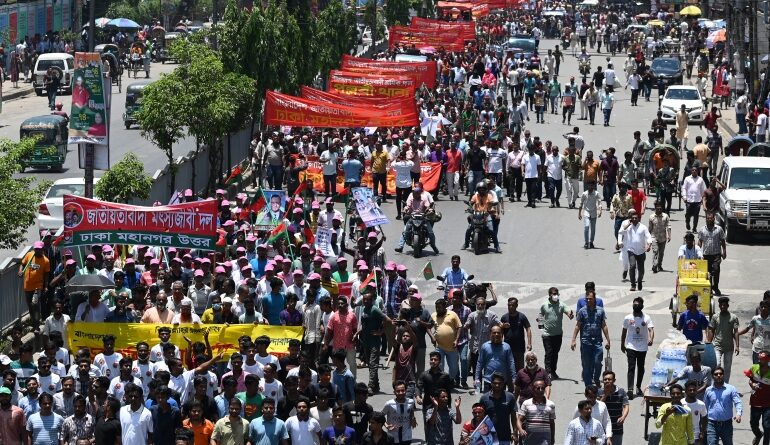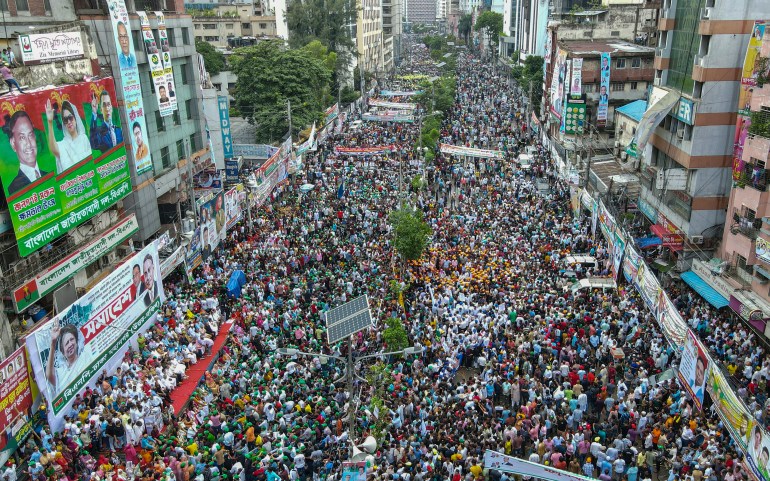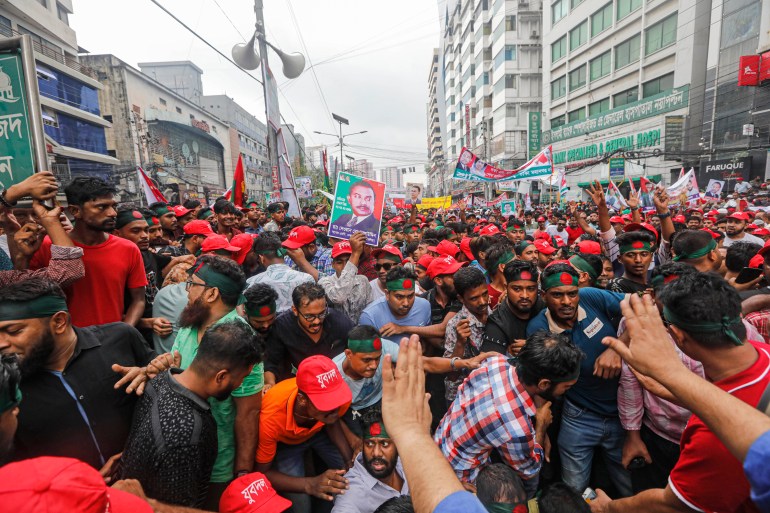
Tens of thousands of people are marching in the capital Dhaka and other cities calling on Prime Minister Sheikh Hasina to step down ahead of elections due in January.
At least one opposition activist has been killed and hundreds injured in clashes in Bangladesh as tens of thousands of people demanded the ouster of Prime Minister Sheikh Hasina ahead of elections due in January.
Tens of thousands of opposition activists braved the scorching sun to march in the capital Dhaka and other cities on Tuesday, calling for Hasina’s resignation.
Hasina’s Awami League has ruled the world’s eighth most populous country since 2009 and has been accused of human rights violations and corruption.
People participate in the march to demand Hasina’s resignation in Dhaka [Munir Uz Zaman/AFP]
The opposition Bangladesh Nationalist Party (BNP), led by former prime minister Khaleda Zia and dozens of smaller allies, have called protests across the country to demand that Hasina step down and that the polls be held under a neutral provisional government.
Mirza Fakhrul Islam Alamgir, secretary general of the BNP, called on the government to resign immediately, dissolve parliament and hand over power to an interim administration to help restore democracy in the South Asian country.
In Dhaka, activists and supporters from different parts of the city joined the march that stretched for nearly 13 kilometers, stopping traffic at different points for hours on a busy weekday.
“Many of these people who participated in the march did not necessarily belong to political parties. They came from different walks of life, from taxi drivers to truck drivers to rickshaw pullers who said they were upset with the government because of the economic crisis,” Al Jazeera’s Tanvir Chowdhury said, reporting from Dhaka.
The BNP said its marches were attacked on Tuesday in Dhaka and at least 16 other places.
“Sajib Hossain, one of our activists, was hacked and killed by members of the student wing of the ruling party” in Laxmipur, BNP spokesman Zahir Uddin Swapan told AFP news agency.
He accused the police of opening fire with shotguns on hundreds of BNP supporters in the southern coastal district, injuring at least 200 people.
 Bangladeshi police walk past a motorbike on fire during the march in Dhaka [Munir Uz Zaman/AFP]
Bangladeshi police walk past a motorbike on fire during the march in Dhaka [Munir Uz Zaman/AFP]
Joynal Abedin, a doctor at Laxmipur Sadar State Hospital, confirmed that one person was killed and at least 50 others were injured.
“We need to do an autopsy to find out what caused the death,” he said.
A police inspector said they were not sure the death was a result of clashes between the opposition and the ruling party.
National police spokesman Monzur Rahman declined to comment on the nationwide violence.
 BNP supporters gather for a protest rally in Dhaka last week [File: Mahmud Hossain Opu/AP]
BNP supporters gather for a protest rally in Dhaka last week [File: Mahmud Hossain Opu/AP]
Western governments have expressed concern about the political climate in Bangladesh, where Hasina’s party dominates the legislature.
Its security forces are accused of arresting tens of thousands of opposition activists, killing hundreds in extrajudicial encounters and disappearing hundreds of leaders and supporters.
The elite security force Rapid Action Battalion (RAB) and seven of its senior officers were sanctioned by Washington in 2021 in response to these alleged rights abuses.
 The BNP said its marches were attacked in Dhaka and 16 other places [File: Mahmud Hossain Opu/AP]
The BNP said its marches were attacked in Dhaka and 16 other places [File: Mahmud Hossain Opu/AP]
The United States has called for free and fair elections, and two senior State Department officials met with local officials in Dhaka last week.
The BNP and its allies accuse Hasina’s party of rigging the two most recent elections in 2018 and 2014.
To counter the protests, the ruling party also planned a “peace and development” procession in Dhaka on Tuesday. At least 10 people were injured after BNP and Awami League supporters clashed in the southeastern district of Khagrachhari.
Last week, about 50,000 people attended a rally in Dhaka, which broke up without incident. The BNP and other opposition groups have planned more rallies for Wednesday.
The next general election must be held before the current parliament’s term ends at the end of January.
[ad_2]
Source link





